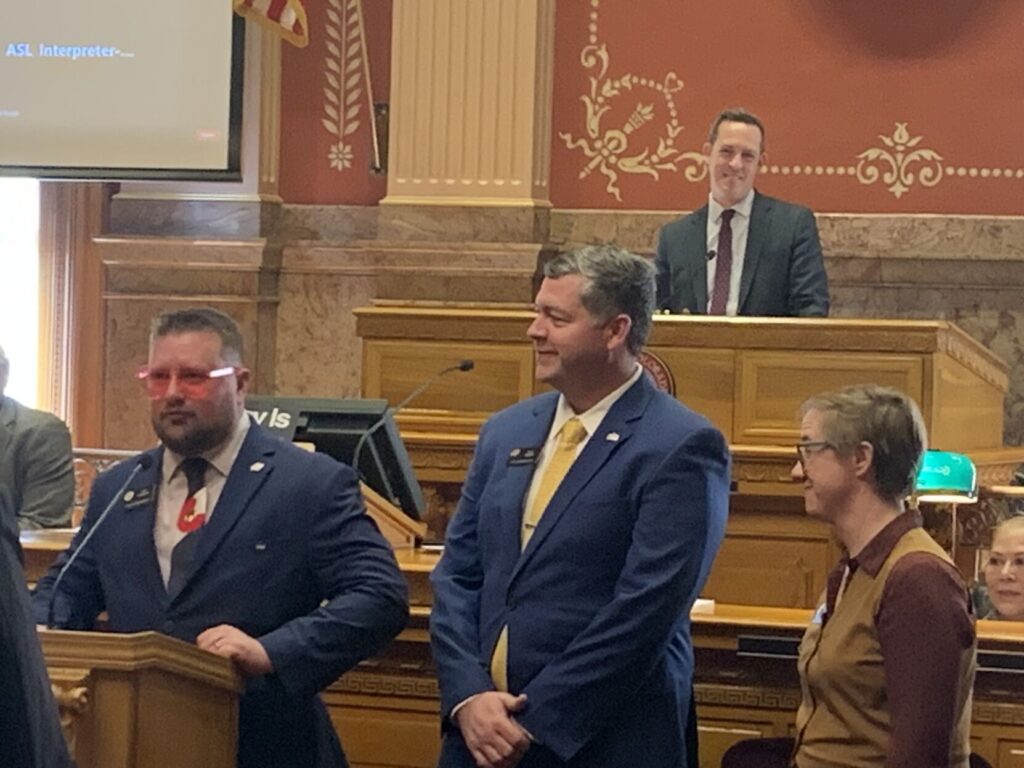Faulty data doesn’t stop bill to ban corporal punishment
Colorado would become the 32nd state in America to outlaw corporal punishment in public schools under a bill approved by the House Education Committee, after lengthy discussion and questions about disputed data about the number of such incidents in the Sheridan School District No. 2 and other districts.
State Rep. Susan Lontine, D-Denver, sponsors House Bill 17-1038 and told the committee Monday, Jan. 23, that studies and research has long found the use of corporal punishment – especially spanking – does not work and is harmful to a young child’s learning and social development.
Currently, Colorado is one of only 19 states that does not have a statutory prohibition on corporal punishment in its schools, although most, if not all, of the state’s 178 school districts have policies against it.
“It does not seem to be something that’s widely used, but it is happening in our schools,” Lontine said. “But if it happens to even one child, that’s one child too many. If you do it at home, it’s child abuse. If you do it in schools, it’s allowed.”
The bill prohibits a person employed by or volunteering in a public school, a state-licensed child care center, family child care home, or a specialized group facility from imposing corporal punishment on a child. “Corporal punishment” means the willful infliction of, or willfully causing the infliction of, physical pain on a child.
School districts would be required to add the prohibition to their conduct and discipline codes. The state Department of Human Services would have to add the ban to its child care licensing rules.
Exceptions would include using force to quell a disturbance, self-defense or to obtain a weapon controlled by a child, as well as to stop physical pain or discomfort caused by athletic activities.
Many committee members questioned the accuracy of data from the U.S. Department of Education’s Office for Civil Rights that claimed most Colorado school districts had very few instances of corporal punishment in the 2011-12 school year, except Sheridan School District No. 2. The office claimed that four-school district had 431 cases of corporal punishment. That number included 347 males and 322 Latinos. Of those, 235 were male and 87 female.
Superintendent Michael Clough testified to the committee that he was shocked and surprised upon learning of the report, and told lawmakers the district number was actually “zero, it wasn’t even in the single digits.”
“We have had a policy that bans corporal punishment since 2010,” Clough said, adding he has been the district’s superintendent since 2008. “We’re trying to figure out how and what happened, but I’d say we need to work on our data collection and I’d be very, very surprised if this wasn’t case of data error or a reporting error” by either the district or Department of Education.
Sheridan School District N0.2 consists of an early childhood center for 3-and 4-year-olds, Alice Terry Elementary School for kindergarten through second grade, Fort Logan Northgate School for grades three through eight, Sheridan High School and an alternative program for older students called Student Outreach and Academic Recovery.
Lontine said when she first saw the number of incidents reported in the Sheridan district, she thought something was wrong.
“Every other district in that report was in the single digits,” she added. Only about 10 of the state’s 178 school districts were included in the report.
Clough said he had talked to an official in the department’s Office of Civil Rights and asked for a correction, but was told that wasn’t possible.
“I feel strongly that ‘spare the rod and spoil the child’ has no place in public schools,” Clough added. “I was surprised and disappointed about this and want to assure everyone that Sheridan will not be the poster child for corporal punishment.”
Despite Clough’s repeated statements and explanations about the data error, committee members discussed and questioned it at length. State Rep. Paul Lundeen, R-Monument, noted that if the data was incorrect about the Sheridan district, it might also be wrong about other districts.
Clough said there likely are “places in Colorado that practice corporal punishment, but I think it would be very doubtful that any district had a policy in favor of it.”
Testimony backs bill
Among groups testifying in support of the bill were the Colorado Children’s Campaign, Advocacy Denver, Denver Public Schools, ARC of Colorado, Colorado Education Association, Colorado Parent Teacher Association and Padres y Jóvenes Unidos.
That testimony noted one urban school district reportedly sent parental permission slips home, seeking permission to use corporal punishment when warranted.
“This is a policy that is arcane and obsolete in modern-day society,” Lontine said. “Why should it be OK for a grown person to hit a little kid? The answer is, it’s not.”
Lontine noted New Jersey was the first state to outlaw corporal punishment in schools in 1867 and the most recent was New Mexico in 2012.
Just before a vote was taken on the bill, Lundeen repeated a phrase several other committee members said during the hearing: “Never, never, never hit a child.”
Minimal impact expected
The fiscal note for the bill states passage of the measure could result in a minimal increase in the workload in the trial courts in the Judicial Department. While the bill does not specify enforcement or a penalty for violations, the note assumed additional civil court cases could be filed by parents or guardians in cases where corporal punishment is used; no additional criminal filings are expected.
The Department of Human Services will have a minimal one-time increase in workload to update child care licensing rules, if the bill is approved and becomes law. But given a similar existing rule prohibiting corporal punishment, the note said the bill is not expected to affect the number of complaints about corporal punishment in licensed child care facilities.
Schools and school districts may need to update policies, and additional staff training may be required, the note stated. Overall, it is assumed that schools and school districts regularly update policies and train staff, so any increase in workload can be accomplished as part of those efforts.
After the committee’s 11-2 vote, the bill goes to the House floor. If it becomes law, the bill would take effect Aug. 9.











